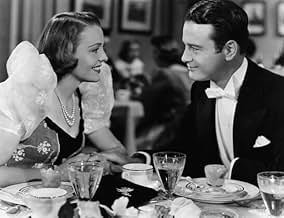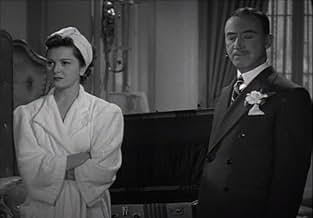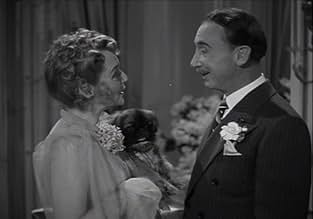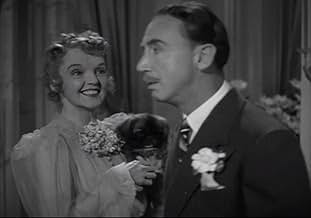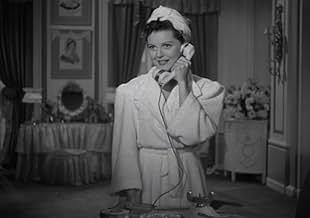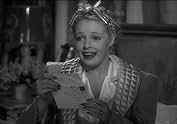Aggiungi una trama nella tua linguaA drunken college boy invites a taxi dancer to spend the weekend at his snobbish school.A drunken college boy invites a taxi dancer to spend the weekend at his snobbish school.A drunken college boy invites a taxi dancer to spend the weekend at his snobbish school.
Peter Lind Hayes
- Skel
- (as Peter Hayes)
Ernie Alexander
- Parking Attendant
- (non citato nei titoli originali)
Rod Bacon
- College Boy
- (non citato nei titoli originali)
Lee Bennett
- College Boy
- (non citato nei titoli originali)
Trama
Lo sapevi?
- QuizFirst film where Lana Turner receives top billing.
- Citazioni
Jane Thomas: Listen, you wisecracking, bad-mouthing glamour girl. I've had all your kind of friend that I can use. Why, I wouldn't breathe the same air with you and your pedigree polo shirts for another five minutes.
- ConnessioniFeatured in Discovering Film: Lana Turner (2015)
- Colonne sonoreLoveliness
(1939)
Music by Edward Ward
Lyrics by Bob Wright and Chet Forrest
Played during the opening credits
Sung by Dale Fellows (uncredited) at the social
Hummed by Lana Turner (uncredited)
Played as background music often
Recensione in evidenza
A year after appearing together in "Love Finds Andy Hardy", Lana Turner and Ann Rutherford were paired up in two 1939 films: "These Glamour Girls" and "Dancing Co-Ed". Beyond having a college setting (with Turner playing an outsider), there was little similarity between the two films. Although much more ambitious, "Those Glamour Girls" is not in the same class as the more entertaining and lyrical "Dancing Co-Ed".
It is the standard depression era story contrasting the shallowness of the upper class and their moral depravity with the virtuous working class. Direction-less rich boy Philip S. 'Phil' Griswold III (Lew Ayres) invites dance club hostess Jane Thomas (Turner) to spend the weekend at his elite college where the various clubs are hosting a big dance.
Jane receives a mixed welcome from his crowd, the rich boys view her as an exotic novelty and the snooty girls as an inferior. As always happens in this standard story the rich people learn a lot of life lessons from the poor girl and are transformed into better, more responsible and mature citizens.
Turner is horribly miscast as the tough girl with a heart of gold. She has little chemistry with Ayres and looks grumpy and distressed most of the time. Her biggest assets were her smile and comic timing, making her much better physically as the wholesome girl-next-door than in this type of "too serious" role. Except for one very nice dance number at the midway point of the film there is nothing to even suggest that she would become a star.
This early twenties coming-of-age story tries to tackle more issues than it can reasonably handle, too many issues mean at best a superficial treatment for each. The results are disappointing as little of the interplay and character growth is convincing.
One exception is an excellent performance by Marsha Hunt as Betty Ainsbridge, a slightly older girl who has been left behind by her contemporaries and is trying to fit in with the younger crowd. Hunt (also a "Andy Hardy" veteran) does a great job of conveying the insecurities and desperation of a woman of that era confronting a future that holds fewer and fewer options for her. Unfortunately, her story is almost incidental to the main action of the film.
Then again, what do I know? I'm only a child.
It is the standard depression era story contrasting the shallowness of the upper class and their moral depravity with the virtuous working class. Direction-less rich boy Philip S. 'Phil' Griswold III (Lew Ayres) invites dance club hostess Jane Thomas (Turner) to spend the weekend at his elite college where the various clubs are hosting a big dance.
Jane receives a mixed welcome from his crowd, the rich boys view her as an exotic novelty and the snooty girls as an inferior. As always happens in this standard story the rich people learn a lot of life lessons from the poor girl and are transformed into better, more responsible and mature citizens.
Turner is horribly miscast as the tough girl with a heart of gold. She has little chemistry with Ayres and looks grumpy and distressed most of the time. Her biggest assets were her smile and comic timing, making her much better physically as the wholesome girl-next-door than in this type of "too serious" role. Except for one very nice dance number at the midway point of the film there is nothing to even suggest that she would become a star.
This early twenties coming-of-age story tries to tackle more issues than it can reasonably handle, too many issues mean at best a superficial treatment for each. The results are disappointing as little of the interplay and character growth is convincing.
One exception is an excellent performance by Marsha Hunt as Betty Ainsbridge, a slightly older girl who has been left behind by her contemporaries and is trying to fit in with the younger crowd. Hunt (also a "Andy Hardy" veteran) does a great job of conveying the insecurities and desperation of a woman of that era confronting a future that holds fewer and fewer options for her. Unfortunately, her story is almost incidental to the main action of the film.
Then again, what do I know? I'm only a child.
- aimless-46
- 8 mar 2006
- Permalink
I più visti
Accedi per valutare e creare un elenco di titoli salvati per ottenere consigli personalizzati
Dettagli
Botteghino
- Budget
- 403.000 USD (previsto)
- Tempo di esecuzione1 ora 19 minuti
- Colore
- Proporzioni
- 1.37 : 1
Contribuisci a questa pagina
Suggerisci una modifica o aggiungi i contenuti mancanti

Divario superiore
By what name was These Glamour Girls (1939) officially released in Canada in English?
Rispondi

